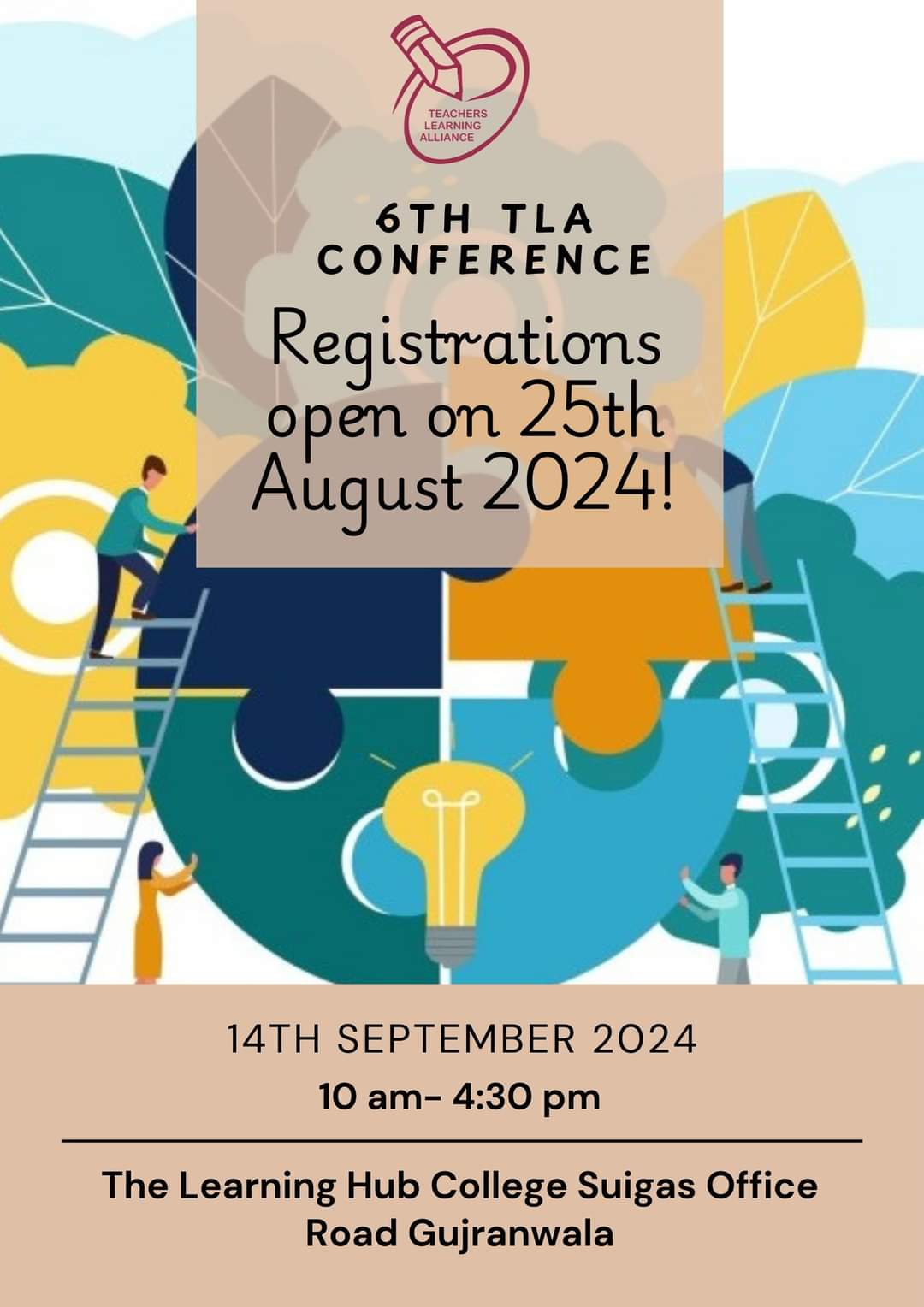
- This event has passed.
1st TLA Annual Conference 2019
October 19, 2019 @ 10:00 am - 4:30 pm
Altaf Muhammad Saleem
(Secretary Crescent Educational Trust)
 Dr. Syeda Arifa Zahra
Dr. Syeda Arifa Zahra
Dr. Syeda Arifa Zahra is an eminent professional, educationist, culture expert, gender specialist, human rights activist and social nationalist, Dr. Arifa has gained a prominent position in society due to her exemplary work in these areas. Her achievements are attributed to her skills to articulate her intellect powered by her conviction, dedication and leadership quality for education, culture and human rights, especially for women. Educated in Pakistan and US in Urdu and History, she takes pride in being a humble student of life and a sense of honor in her roots that lie in the great tradition and glorious history of the sub-continent. Among her many achievements, her role as chairperson NCSW, her contribution to promotion of the arts, especially literature, and opening the minds of students to the possibilities of life are most cherished to her. She earned her PhD from the U.S. in 1983, and takes pride in continuing her education as a humble student of “life”. She has a great sense of pride in her roots that lie in the great tradition and history of the sub-continent and continues to generate though on events in the past, present and future in students of all ages. Among her many achievements, her role as chairperson NCSW, her contribution to promotion of the arts, especially literature, and opening the minds of students to the possibilities of life are most cherished to her.
Workshop Session 1 (12:00-1:30)
Abstract
Practicing educators get limited opportunities to engage in critically reflective activities about their educative practice. In an increasingly complex and challenging profession, the need for teachers, administrators and school systems to become involved in professional development activities is ever present. Undertaking a small-scale research provides them with a systematic, reflective approach to address areas of need within their respective domains.
This session discusses the process and benefits of action research. The research is carried out to improve learning. It helps educators to scientifically solve the problems that occur during their classroom teaching and improve learning objectives. This is different to academic research; where academic research can be applied to the larger population in general, action research is more focused on the researchers. This means that the research area is most relevant to the educators’ professional growth and on-job competence. Perhaps even more important is the fact that action research helps educators be more effective at what they care most about—their teaching and the development of their students. Seeing students grow is probably the greatest joy educators can experience. When teachers have convincing evidence that their work has made a real difference in their students’ lives, the countless hours and endless efforts of teaching seem worthwhile.
About Aafia Qureshi
 Aafia Qureshi is the Senior Academic Manager, EES, British Council, Pakistan. She has worked as the General Manager Training at PORTAL Consultants and a consultant/trainer for Cambridge English Language Assessment, a part of the University of Cambridge UK. She is an MA ELT with distinction from Kinnaird College for Women, Lahore and a Postgraduate Certificate in Professional Development from the University of Exeter,St Mark and St John, UK. She is a certified Tutor-assessor for British Council, UK and Trinity College programme – Professional Awards for Teacher Educators. She is also a Cambridge authorised trainer for ICELT (In-service Certificate in English Language Teaching) and TKT. She has completed her CELTA from International House, Thailand. She has taught MA ELT programme in Kinnaird College for Women, Lahore College for Women University and has taught the ELT Diploma programme at the University of the Punjab. She is also the Conference Coordinator for SPELT (Society of PakistanEnglish Language Teachers) 2011 – 2017.
Aafia Qureshi is the Senior Academic Manager, EES, British Council, Pakistan. She has worked as the General Manager Training at PORTAL Consultants and a consultant/trainer for Cambridge English Language Assessment, a part of the University of Cambridge UK. She is an MA ELT with distinction from Kinnaird College for Women, Lahore and a Postgraduate Certificate in Professional Development from the University of Exeter,St Mark and St John, UK. She is a certified Tutor-assessor for British Council, UK and Trinity College programme – Professional Awards for Teacher Educators. She is also a Cambridge authorised trainer for ICELT (In-service Certificate in English Language Teaching) and TKT. She has completed her CELTA from International House, Thailand. She has taught MA ELT programme in Kinnaird College for Women, Lahore College for Women University and has taught the ELT Diploma programme at the University of the Punjab. She is also the Conference Coordinator for SPELT (Society of PakistanEnglish Language Teachers) 2011 – 2017.
او لیول اردو بطور ثانوی زبان 3248 کے پرچہ اول میں موجود تخلیقی کام کی مختلف جہات کو اُن کے مقرر کردہ معیارات کے مطابق ضابطہء تحریر میں لانے کے لیے دلچسپ اور سہل طریقہ ہائے کار، جنہیں اپنا کر نہ صرف او لیول کے طلبہ، بلکہ کسی بھی تعلیمی درجے کے طلبہ کو تخلیقی کام کی جانب با آسانی مائل کیا جاسکتا ہے۔
صائمہ ساجد کا تعارف
درس و تدریس کے میدانِ عمل میں گزشتہ کم و بیش بیس برس سے فکر و فن کی تمام کاوشوں کو بروئے کار لاتے ہوئے محترمہ صائمہ سجاد نسلِ نو کی آبیاری میں منہمک ہیں۔اردو زبان و ادب میں ماسٹرز ڈگری کی حامل ہیں ۔
گزشتہ تیرہ برس سے لاہور سکول اوف لرننگ کے ساتھ وابستہ ہیں اور یہاں او لیول کی کلاسز لینے کے ساتھ اکیڈمک کوارڈینیٹر برائے اردو ، خدمات بھی سرانجام دے رہی ہیں۔ اس کے علاوہ پرائیویٹ سکولز کے لیے ان کی تصنیف و تالیف کردہ نصابی کتب کا ایک پراجیکٹ بھی زیرِ تکمیل ہے
Abstract
Educational technologies are the need of today’s world as our children are tech-learners. A technology that is relatively new to the educational sector of Pakistan is the inculcation of robotics. Robotics is a true picture of STEAM (Science, Technology, Engineering, Arts and Mathematics) education as it thoroughly covers concepts and aspects of all the involved subjects simultaneously. It provides students with a new paradigm of imagination and problem solving.
In this 90 minute session, the participants will be doing hands on working on WeDo 2.0 and Mindstorms EV3 kits along with basic programming to Define, Design, Develop and Deliver a project through collaborative learning. This will help them understand the value and crux of ‘learning by doing’ at primary and middle levels.
About Fatima Jehandad
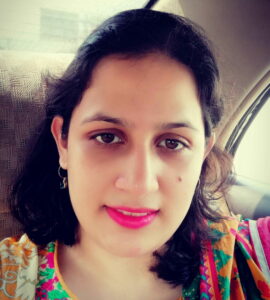 Fatima Jahandad is working as Senior Coordinator for ICT at Bahria Town School and College. With a degree in Computer Arts, she initiated her career by designing and developing content for smart boards 7 years ago. Since then, she has been associated with different trainings and programmes regarding ICT and Educational Technologies, most recent being Robotics. She is running a robotics programme at school as part of STEAM education.
Fatima Jahandad is working as Senior Coordinator for ICT at Bahria Town School and College. With a degree in Computer Arts, she initiated her career by designing and developing content for smart boards 7 years ago. Since then, she has been associated with different trainings and programmes regarding ICT and Educational Technologies, most recent being Robotics. She is running a robotics programme at school as part of STEAM education.
Abstract
This workshop covers a range of helping skills, which are basic for any teacher. Without helping skills, teachers cannot have a basic understanding of their students’ concerns and needs in order to best know how to help them. If the teacher does not have some of the basic helping skills, many students who are crying out for help will only be seen as noncompliant and difficult.
In this workshop, the focus will be on developing empathy and understanding motivation as arising from three basic human needs being satisfied, learning and using practical skills, such as: non-verbal listening, reflective listening, and guiding strategies. Through learning and applying these skills, teachers will begin to develop some of the practical skills required for engendering trust and respect within their students, which in turn enables the maintenance of a good relationship: the very foundation of student motivation for learning.
About Elizabeth Maria Schwaiger
Elizabeth has a wide diversity of clinical and neuropsychological experience with all age groups in a variety of US research and teaching hospitals. She has worked as a Lecturer at Northeastern University, Boston, US; made presentations and authored publications in the areas of interpersonal theory and therapy, autism spectrum disorder, trauma, depression, and traumatic brain injury. Her areas of specialization include clinical psychology and neuropsychology. She joined FCCU in January 2016 and established FCCU’s Cognitive Psychology Research Laboratory in 2018.
Abstract
Research shows that observation, reflection and feedback have a high impact on improving teaching practice. This process provides an opportunity to disseminate good practices amongst colleagues by sharing thoughts on teaching practice and supporting each other’s development of teaching skills.
Reflection and feedback, through a structured and negotiated way, enable a teacher to refine and improve their teaching practices and is a source of on-going teacher’s professional development. This method is considered as one of the best ways to support teachers professionally and to enhance student learning when situated in a broader culture of collaboration, mutual trust and respect.
To be successful, observations must have a specific focus, for example, lesson structure or the articulation of lesson objectives. Consequently, self-reflection and feedback provide a valuable opportunity for the teacher being observed to evaluate his/her teaching and chalk out areas of strength and prioritize areas for improvement.
For understanding this notion better, come and experience a run-through yourself! It will capture your interest and attention, and develop you into an effective resource for your educational organization.
About Saadia Kashif
Saadia Kashif has been working with Beaconhouse for more than a decade in different capacities. She started her career as a Primary school English teacher and then taught English to middle and O level. She also taught students of PGD and Master in ELT and ELTL at the University of the Punjab. She has attended British Council’s Hornby Regional School, Professional Award and CELTA for teacher training and teaching of English to Adults. Her qualification includes two MA degrees and an MPhil (in process). She has worked in the school administration, as a teacher trainer, curriculum coordinator, material developer, a freelance Consultant for British Council and reviewer for Directorate of Staff Development, Punjab. Currently, she is working in the capacity of a School Evaluation Associate at Beaconhouse Head Office.
Abstract
Encouraging inquiry; developing a reflective community of responsible learners who take ownership of their action/s and understand its impact on themselves, others and the world is the science behind science.
This workshop aims towards looking at science as a phenomenon of change in terms of a discipline, now transcending boundaries of the disciplinary approach. This will enable the teachers of today to become and raise life-long learners, who take science as a medium to appreciate and explore the world; transforming the perspective of science from content driven to concepts and skills.
About Lubaba Batool
Lubaba Batool is an IB Practitioner and is working as the IB PYP Academic Manager at Beaconhouse Newlands Lahore. She is a certified IB professional who has always enjoyed learning as a teacher and a trainer. She is a Political Research Analyst with a Post-Graduate degree in Communication Sciences. She is an educationist who believes that every little step in the journey of life is a milestone leading towards yet another exploration. All one needs to do is take up on every opportunity to explore and learn.
Abstract
Researchers all over the world have confirmed and re- confirmed the authenticity of Piaget’s C (concrete) – R (representational) – A (abstract) approach and then Bruner’s C (concrete) – P (pictoral) – A (abstract) methodology. Manipulatives have always played a vital role in bridging the gap between these stages. But the effectiveness of manipulatives requires deeper understanding and reflection on teachers’ part. When and how to use manipulatives and how to link them with thinking, problem solving, application and language development, is a key skill to be learned.
In this session, explore the reasons for using manipulatives and learn the hows and whys of their usage, when they lose their effectiveness and how we can make the most out of them. Let’s play, learn and reflect together!
About Wajeeha Abdul Qadir
Wajeeha Abdul Qadir has a Masters Degree in Child Psychology, and has been teaching for the last ten years. Currently she is working as an Academic Coordinator at Lahore School of Learning, and as a Trainer for Primary Mathematics for MacMillan.
Abstract
In the era of informational and digital revolution, where the students have access to a vast variety of information and where they are going to perform jobs that do not yet exist, the best skill a teacher may develop is how to LEARN.
Most educationists believe that learning is natural and a byproduct of regular classroom teaching. The cognitive science of learning, however contradicts this belief and explains that the ability to learn effectively is an acquired skill and is consciously developed in students.
This session will help participants understand what is effective learning, how do we learn and how our brain makes, stories and retrieves memories/information. The participants will also talk about effective instructional strategies based on research to maximize learning for all students.
About Marvi Khan
Ms. Khan holds a Bachelor’s Degree in Economics and a PD Certificate for Educational Leadership & Management. A certified Master Trainer, with over 14 years of successful experience of teaching diverse group of learners. She is a student of Mind Sciences, a certified Hypnotherapist and an NLP (Neuro Linguistic Programming) Practitioner.
Abstract
As the title suggests, the workshop is about developing a profound know how about global technological advancements, to facilitate students in preparing themselves for not merely surviving, but thriving in the present world scenario! More and more studies show that technology integration in the curriculum improves students’ learning processes and outcomes.
This workshop is designed to help professionals explore and develop their teaching pathways vis a vis technology integration. It also facilitates recording the journey of progress through a vast array of highly engaging and interactive tasks. Participants will learn how technology, when integrated into the curriculum, revolutionizes the learning process.
About Amber Noor Mustafa
 Ms. Amber Noor Mustafa has been associated with academia for the past 17 years in various capacities. More than half of her career has been invested in professional development of teachers and leadership teams in schools. She has been engaged in sessions by Punjab Education Foundation, LUMS, University of Lahore, the British Council and Beaconhouse National University to name a few.
Ms. Amber Noor Mustafa has been associated with academia for the past 17 years in various capacities. More than half of her career has been invested in professional development of teachers and leadership teams in schools. She has been engaged in sessions by Punjab Education Foundation, LUMS, University of Lahore, the British Council and Beaconhouse National University to name a few.
She has an MPhil in Educational Leadership and Management and a PGCert in Professional Education from Marjon UK. She is an accredited programme leader for the Cambridge University Diploma in Educational Leadership. Very recently she presented a paper titled, ‘Contribution of Distributive Leadership to Capacity Building and Succession Planning’ at a conference in Dubai and got the best presentation award.
Abstract
“Oh my God! I have to rush to my next class”, “Oh God, I have got piles of assignments/copies to check and here the bell rings”, “I will take a surprise test in next week as I didn’t have time to ask my students about the conclusion”. These are few of the sentences you would have said after the class, but did you spend a spare moment of reflecting back on whatever you have just taught in the classroom minutes before? Yes, then Well Done!
If not, then WAIT & THINK, that “Am I compromising the quality of teaching?” “Am I doing justice with the students’ understanding of my lectures?” “Did any of my student not perform in the classroom the way he/she should?”
This interactive session will not only provide participants with different ideas to reflect upon their teaching as well as classroom management skills, but will also help them realize the importance of reflection in their teaching career. These fun learning activities will help participants manage their itty-bitty time between the lectures to reflect. Enjoy Teaching and don’t forget to REFLECT.
About Sarosh Ahmad
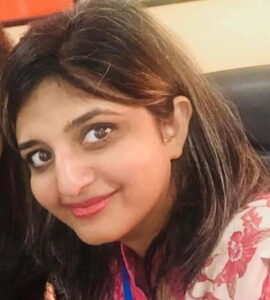 Ms. Sarosh Ahmad is English Language instructor, working at Social Welfare & Bait ul Maal dept, Punjab with 15 years teaching experience. She is M.Phil. ELT from Kinnaird College, Lahore. She is a non-traditional trainer/presenter who believes in bringing the best out of a learner. She believes in fun based, motivating and high-spirited learning structure.
Ms. Sarosh Ahmad is English Language instructor, working at Social Welfare & Bait ul Maal dept, Punjab with 15 years teaching experience. She is M.Phil. ELT from Kinnaird College, Lahore. She is a non-traditional trainer/presenter who believes in bringing the best out of a learner. She believes in fun based, motivating and high-spirited learning structure.
Abstract
The thinking classroom is more than a series of approaches to learning. It’s also a philosophy to learning. ‘Together Towards Tomorrow” blends very well with thinking skills.
A thinking classroom is a classroom that conducive to thinking, a space that is inhabited by thinking students as well as students thinking collectively, learning together; constructing knowledge and understanding through activity and discussion. Thinking calls for activities. Thinking requires students asking questions and finding the answers.
Come and join ‘To Think or NOT To Think’ in order to learn how you as the teacher can promote thinking in your classrooms. Put on your Thinking Caps!!!! Let’s get to tomorrow, today!!
“When teachers feel a sense of ownership over their classrooms, and when students feel a sense of ownership over their learning, that is when productive teaching takes place.”
About C.J.Dubash
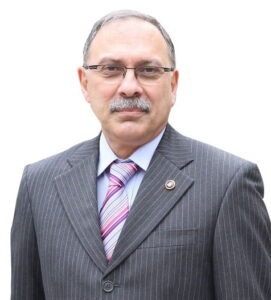 Dr. C. J. Dubash is the Chief Academic Officer at Lampro Mellon Train-for-Work program harnessing the RISC-V revolution in the System-on-Chip design industry. He has previously been the Vice Rector (Intermediate) and Dean of the Faculty of Education at Forman Christian College. He holds a Ph.D. degree from the USA in Educational Psychology; two M.Ed. degrees from the USA in Science Education and School Administration respectively; and an MSc from Karachi in Microbiology. He has 40 years of teaching experience and has been training teachers for over 35 years. He has presented at International Teacher Conferences at Bangkok, Katmandu, Kuala Lumpur, New Delhi, Abu Dhabi, Athens and Istanbul. He has fourteen research publications and many articles to his credit. He is associated with HEC and PHEC as Resource Person, and is on the Boards of the Punjab Curriculum and Textbook Board and the Presbyterian Education Board in Pakistan.
Dr. C. J. Dubash is the Chief Academic Officer at Lampro Mellon Train-for-Work program harnessing the RISC-V revolution in the System-on-Chip design industry. He has previously been the Vice Rector (Intermediate) and Dean of the Faculty of Education at Forman Christian College. He holds a Ph.D. degree from the USA in Educational Psychology; two M.Ed. degrees from the USA in Science Education and School Administration respectively; and an MSc from Karachi in Microbiology. He has 40 years of teaching experience and has been training teachers for over 35 years. He has presented at International Teacher Conferences at Bangkok, Katmandu, Kuala Lumpur, New Delhi, Abu Dhabi, Athens and Istanbul. He has fourteen research publications and many articles to his credit. He is associated with HEC and PHEC as Resource Person, and is on the Boards of the Punjab Curriculum and Textbook Board and the Presbyterian Education Board in Pakistan.
Abstract
Vocabulary is the basic and most important element in teaching and learning. To help students understand new words, teachers do use variety of techniques but at times fall short of creating independent learners.
This session is specially designed to facilitate teachers on using pictures in a variety of ways – ranging from warm-up tasks to recaps- to instill curiosity of learning among students. As we shall say it ‘pictures’ speak louder than words because they not only motivate but also help students become familiar with new vocabulary.
Picture perfect playground is a jam-packed hands-on pictorial activity session, where teachers will not only learn the new ways of using pictures but also practice them during the session.
About Saadia Saaed
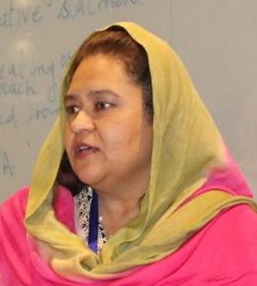 Sadia Saeed is a UK certified trainer and Life Coach with over 15 years of teaching and training experience. Sadia is a double masters in English Literature and English Language Teaching (ELT) and a PhD scholar. She has worked at LUMS, DHA Education System and Oxford University Press. She is currently working as a freelance trainer, curriculum consultant, textbook editor and a life coach.
Sadia Saeed is a UK certified trainer and Life Coach with over 15 years of teaching and training experience. Sadia is a double masters in English Literature and English Language Teaching (ELT) and a PhD scholar. She has worked at LUMS, DHA Education System and Oxford University Press. She is currently working as a freelance trainer, curriculum consultant, textbook editor and a life coach.
She has numerous training sessions in her kitty bank, conducted across Punjab and Sindh Provence through Beaconhouse School System, Paramount Books, Oxford University Press and Portal Consultants.
Abstract
Learning stays for life when a certain idea, concept or a problem find its meaningful connection with the real world. Transdisciplinary Approach of teaching leaps across the boundaries of disciplines and give the learners an opportunity to construct their own meaning and transfer their learning into application.
This workshop will aim to increase awareness of this approach and share some strategies for collaboration, lesson planning and its execution. The workshop will benefit practitioners who take teaching and learning beyond the boundaries of disciplines and provide their learners with hands on experience.
About Urooj Shahab
Urooj Shahab is an IB Practitioner and is working as a Curriculum Leader of IB Primary Years Programme at Beaconhouse Newlands. She has done several IB certificate courses and has also completed her ICELT (International Certificate in English Language Teaching). A ceramist and an Art graduate, Urooj brings her creative flair to language classrooms and believes that language learning is a creative journey that takes one to uncharted territory, as long as you are adventurous enough to take the first step!
Abstract
Teaching Pre-School is a challenging task but interesting activities help to motivate the students and hold their attention.
In this interactive session, participants will take a trip around the Pre-School world. They will start with Islamiyat and move on to songs and poems, stories, themselves, Pakistan, the world, science concepts, animals, transport, plants, weather, the environment, life skills including first aid ……… and much more.
The presenter will demonstrate how to maintain a balance, to keep up the tempo, use teaching aids and create a lively learning environment. The key is to be well prepared and extremely enthusiastic while interacting with the children smooth transitions from one concept to another are crucial.
About Umber Shaikh
Umber Sheikh is a very popular workshop presenter. She has nearly 24 years’ experience of teaching pre-school, and more than 19 years of training elementary level teachers. Currently, she is working as the Pre-school Coordinator at the Lahore School of Learning. Her methods are unique and innovative, specially designed for new and untrained teachers. She combines traditional and modern techniques with her own practices. She has devised highly successful methods for teaching children with learning disabilities and special needs.
Workshop Session 2 (02:20 PM-03:20 PM)
Abstract
Teachers have long known that feeling safe and secure in school helps students focus their energy on learning.
A good teacher-student relationship is a must, but teachers have to think and create an environment where students have a strong and positive relationship with each other. “Great classrooms are characterized by positive, open relationships, mutual respect and a shared responsibility for the learning process.” Meehan. (1959)
In this 60 minutes’ session, the participants will be able to learn 3 strategies which will help them in building positive, compassionate communities in their classrooms. They will consider the value of creating an optimistic environment and see the wonders this brings in teaching and learning.
About Hina Irfan
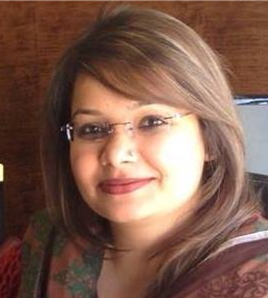 Hina Irfan is Head of Training and Vice Principal at the Bahria Town School & College. She has a degree in English Linguistics from NUML and ICELT (In-Service Certificate for English Language Teachers) from the University of Cambridge. She has been working in the education sector for the past 12 years and has presented at several conferences.
Hina Irfan is Head of Training and Vice Principal at the Bahria Town School & College. She has a degree in English Linguistics from NUML and ICELT (In-Service Certificate for English Language Teachers) from the University of Cambridge. She has been working in the education sector for the past 12 years and has presented at several conferences.
Abstract
This interactive workshop invites teachers to reflect on what Inclusion means in practical terms and the questions that teachers need to ask themselves to ensure that every child in their classroom truly has the same access to a quality educational experience. By setting up a short quiz, I will invite attendees to honestly assess biases they might have and give examples from my own self enquiry.
I will then set up inclusive activities for the participants, followed by discussion on how they felt during the activities. Finally, we will look at some of the challenges to setting up an inclusive classroom in our contexts and analyse how a teacher can model inclusion.
About Fiona Robertson
Fiona Robertson is a trained secondary teacher who began working for the British Council on overseas projects in 2011. She has managed projects in Italy, the Middle East and South Korea and came to Pakistan in 2018. She contributed a chapter in the 2018 British Council publication “Creating an Inclusive School Environment”.
Abstract
Specific, constructive feedback about learning is one of the most powerful influences on student achievement. The next step to feedback is feed-forward which is often overlooked by teachers. Feed forward provides an outline of the next steps to be taken.
Feedback addresses ‘What progress have I made towards the goal?’ whilst Feed Forward asks ‘What further improvements need to be made to advance my progress?’ (Hattie & Timperley, 2007). The major feed forward questions are ‘Where am I going?’, ‘How am I doing?’ and ‘Where next?’ An ideal learning environment or experience is when both teachers and students seek answers to each of these questions (Hattie, 2009).
In this session, teachers will explore ways to give a combination of both feedback and feed forward in order to help learners move forward.
About Shehla Sajid
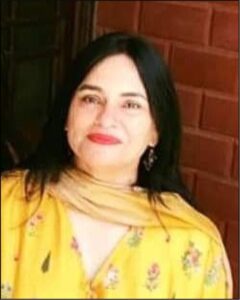 Shehla Sajid has done her Masters in English Language Teaching from Kinnaird College for Women. She also has a Postgraduate Certificate in Professional Development from the University of Exeter UK. She has worked as a Teacher Trainer at Beaconhouse School System for more than a decade. After that she spent six years as Head of O’ Levels at The City School. Currently she is working as Manager Training at The Crescent Model Higher Secondary School.
Shehla Sajid has done her Masters in English Language Teaching from Kinnaird College for Women. She also has a Postgraduate Certificate in Professional Development from the University of Exeter UK. She has worked as a Teacher Trainer at Beaconhouse School System for more than a decade. After that she spent six years as Head of O’ Levels at The City School. Currently she is working as Manager Training at The Crescent Model Higher Secondary School.
Abstract
“An Intelligence is the ability to solve problems or to create solutions to the products that are valued within one or more cultural settings.” Howard Gardner
Gardner suggests that virtually everyone has the capacity to develop all eight intelligences to a reasonably high level of performance if given the appropriate encouragement, enrichment, and instruction. There is no standard set of attributes that one must have to be considered intelligent in a specific area. MI theory emphasizes the rich diversity of ways in which people show their gifts within intelligences as well as between intelligences.
In this 60 minute session, teachers will revisit their definition of intelligence and genius. They will discover the differences among their learners and talk about how to make their lessons more effective.
About Samia Wahid
 Mrs. Samia Wahid has worked as an English Teacher in Beaconhouse School System for ten years. She has worked as an O level English Teacher and had been playing her part as an administrator at BSS. She has the Certificate of Professional Education from the University of Exeter (Marjon), UK after her PGD in ELT from the University of Punjab, Lahore. Currently she is working as the vice Principal of The Learning Hub, O Level Branch.
Mrs. Samia Wahid has worked as an English Teacher in Beaconhouse School System for ten years. She has worked as an O level English Teacher and had been playing her part as an administrator at BSS. She has the Certificate of Professional Education from the University of Exeter (Marjon), UK after her PGD in ELT from the University of Punjab, Lahore. Currently she is working as the vice Principal of The Learning Hub, O Level Branch.
About Khadija Irfan
 Mrs. Khadija Irfan has worked as an English Teacher in Beaconhouse School System for six years. She has also worked as an English Subject Specialist in Punjab Education Foundation. She has attended a number of workshops conducted by British Council, Pakistan Montessori Council, Centre of Inclusive Care, Agha Khan University and Cambridge University. Currently she is working as a Head Teacher of The Learning Hub, Cambridge Primary, Gujranwala.
Mrs. Khadija Irfan has worked as an English Teacher in Beaconhouse School System for six years. She has also worked as an English Subject Specialist in Punjab Education Foundation. She has attended a number of workshops conducted by British Council, Pakistan Montessori Council, Centre of Inclusive Care, Agha Khan University and Cambridge University. Currently she is working as a Head Teacher of The Learning Hub, Cambridge Primary, Gujranwala.
Abstract
STEAM (Science, Technology, Engineering, Art and Math) is an approach that challenges the critical thinking and ability to enquire of a learner. It provides learners with a platform to enhance the skills required for 21st Century employers. Through this interdisciplinary approach, learners are equipped to cope with the needs and challenges of 21st century.
In this 60 minute workshop, the participants will learn about the core purpose of STEAM, its scope and approach, and the importance of its implementation in today’s world. For an effective learning experience, they will learn what STEAM Model is and how this process works. The participants will acquaint themselves with information on updated global trends in STEAM education and how to become a STEAM facilitator.
About Michelle Sharaf
During her education at The Butler University and University of Illinois, Michelle Sharaf had many opportunities to familiarize herself with interdisciplinary studies and forest classes. She has worked at The Nature Conservancy Illinois, Simon Cooper Institute for Cancer Illinois and World Wide Fund for Nature Pakistan. Currently, she works as an environmental coordinator at Crescent Model Higher Secondary School where environmental awareness is increased through STEAM education and forest classes.
Abstract
“Human behavior flows from three main sources: desire, emotion and knowledge”- Plato.
Problematic behavior of students is an issue faced by every teacher. This in turn affects their learning and at times other learners as well. In today’s era, students are much smarter and digitally intelligent and with the innovation in how they are taught, it is a feat to have them ‘on task’ during all the activities while the lesson progresses.
Students may indulge in problematic behavior in and out of the class due to several reasons; however, to address them accordingly and to keep them on track to become an integral part of the society in future is what a teacher strives for.
About Saadia Shahzad
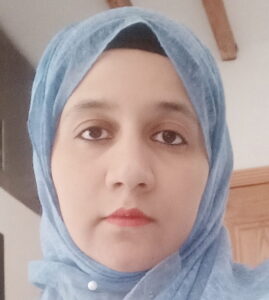 Saadia Shahzad has done her Masters in English Literature from Punjab University. She has been associated with teaching since the last 10 years. She believes that professional development enhances existing knowledge and motivates teachers to strive for excellence in education.
Saadia Shahzad has done her Masters in English Literature from Punjab University. She has been associated with teaching since the last 10 years. She believes that professional development enhances existing knowledge and motivates teachers to strive for excellence in education.
Abstract
“Tell me and I forget, teach me and I may remember, involve me and I learn.” Benjamin Franklin
Teaching history has always been associated with dates and events, which ends in history being learned rather than understood. The definition of history states, “the study of past events, particularly in human affairs”. It is about various events taking place in the past and students of history should be introduced to the idea of why the event took place rather than when. As students they also need to learn and understand the consequences of actions.
History with a Twist will introduce the methods of teaching history that will add more interest and understanding towards events that happened in the past.
About Samreen Kapasi
Samreen Aftab Kapasi is a lawyer by profession, but working in the field of education and theatre for the past 20 years. She has worked as a coordinator at Lahore Grammar School, Aitchison College and Bahauddin Zakriya University-Lahore, and Riphah Institute of Legal Studies. Dramatic reading of letters, prose and poetry is her forte. She is also the Co-Founder of Olomopolo Media and has worked in various productions for television and theatre.
Abstract
Teachers have to actively work on building an interdependent relationship between themselves and the students in their care. For a teacher to work on the relationship, the teacher has to know their own self, and then know the student. The STR is based on character and the competence of the teacher.
In this session, we will explore how we can get to know ourselves and then what measures should be taken to know our students better. Moreover, we will determine the importance of STR in establishing values and skills related to character and competence in a classroom.
Abstract
“A good lesson plan is a living document. It is not set in store, but rather it is a guide that keeps you- the classroom practitioner –engaged and thinking about what you are teaching.”-Otis Kriegel
Lesson Planning gives opportunities for the teacher to think out new ways and means of making the lesson interesting and to introduce thought-provoking questions. Instructional objectives are the first step in writing a strong lesson plan. Therefore, teachers must have a working knowledge of writing specific, observable and measurable objectives, considering the SMARTEST method to avoid tedious, trivial and time- consuming ways.
In this session, you will get to know the significance of objectives and writing them SMARTly through interactive activities.
About Humna Mukhtar
Ms. HumnaMukhtar has worked at Jadeed Dastgir Ideal High School for 8 years. She has attended several workshops conducted by Cambridge International, Professional Development Centre Karachi, British Council and Cambridge Collins Primary at Dubai. Currently, She is working as Curriculum Head Mathematics at Jadeed Dastgir Ideal High School Gujranwala.
About Madeeha Rizwan
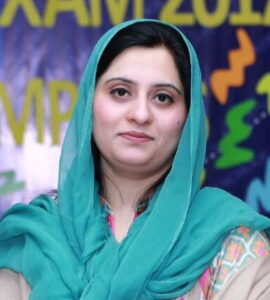 Mrs. Madeeha Rizwan has worked as an English Teacher at Beaconhouse School System for seven years. She has attended a number of training programmes conducted by the British Council, Centre of Inclusive Care, Centre of Excellence DHA Lahore, PORTAL Education Consultants and Cambridge University. Currently, she is working as Head Mistress of Primary Wing at Jadeed Dastgir Ideal High School Gujranwala.
Mrs. Madeeha Rizwan has worked as an English Teacher at Beaconhouse School System for seven years. She has attended a number of training programmes conducted by the British Council, Centre of Inclusive Care, Centre of Excellence DHA Lahore, PORTAL Education Consultants and Cambridge University. Currently, she is working as Head Mistress of Primary Wing at Jadeed Dastgir Ideal High School Gujranwala.
Abstract
Active learning leads to knowledge, inquiry based learning and critical thinking. By working through activities and realistic problems students are more likely to remember the key concepts and recognise misconceptions during the learning process leading to better retention of material and deeper understanding. Learners also benefit from the social environment that is created during the active learning process as they learn from each other’s experience.
This interactive workshop aims to share some interesting and creative ways for science teachers to engage learners in hands on activities. All these activities are designed keeping in view the pedagogy of science teaching that teachers can incorporate in a lesson especially for the learners of today.
About Nadia Sajid
Nadia Sajid is affiliated with the field of education for last eighteen years. She is an MPhil in Education, MA in Education- Pedagogy, Curriculum and Assessment and Masters in English Literature. Her areas of expertise are school evaluation, curriculum designing and teacher training. She has been working with different education systems such as Beaconhouse School System, Beaconhouse National University and The City School. Currently she is working as Manager Academics in Crescent Model Higher Secondary School.
Abstract
Music as a discipline includes the development of creative skills, non-verbal expression, and aesthetic appreciation. Music enables students to communicate in powerful ways that go beyond their spoken language ability. Through music, students can begin to construct an understanding of their environment, recognize patterns and structure and develop their cultural awareness. Music is a part of everyday life. It is a form of non-verbal communication that allows us to convey our ideas, feelings, and emotions. Music contributes to personal, social and physical development. Schools that fail to make music a core subject are making a mistake, because it has advantages for the growing brain and would help all children, including those with dyslexia and autism. From language to science from to history music plays an imperative in developing and enhancing our cognitive abilities.
About Talha Jamil
Talha Jamil is an IB as well as NLP (neuro-linguistic programming) practitioner who specializes in experimental music, vocal coaching, and is currently studying neuro-plasticity and neuro-musicology. He also runs an Arts and music school that primarily focuses on understanding how the brain adopts new patterns and how it affects the performance of a child/adult. He has represented Pakistan internationally on different occasions.
Abstract
Gathering the evidence base in order to understand what works well is a fundamental aspect of our lives. This interactive workshop will test some findings from our recent research work around digital literacy/access and school-based CPD.
Participants will also get a chance to discuss our current research into inclusive classroom practices and transitioning between mediums of instruction. The last part of the workshop will focus on ideas for translating key research findings and recommendations into professional development opportunities for teachers.
About John Shackleton
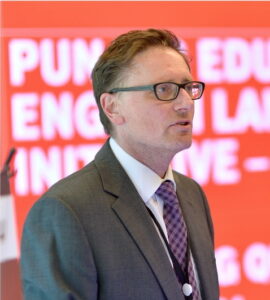 John Shackleton is Director EES at the British Council in Lahore and leads on the Council’s teacher development programmes. He has worked in many different contexts and in many different roles and has been in his current post in Pakistan for 2 years
John Shackleton is Director EES at the British Council in Lahore and leads on the Council’s teacher development programmes. He has worked in many different contexts and in many different roles and has been in his current post in Pakistan for 2 years
Details
- Date:
- October 19, 2019
- Time:
-
10:00 am - 4:30 pm
Venue
- Crescent Model Higher Secondary School
-
Jail Road, Lahore
Lahore, Punjab Pakistan
Organizer
- Teachers Learning Alliance
- Phone:
- +92-300-9426290, +92-337-0453508
- Email:
- teacherslearningalliance@gmail.com

